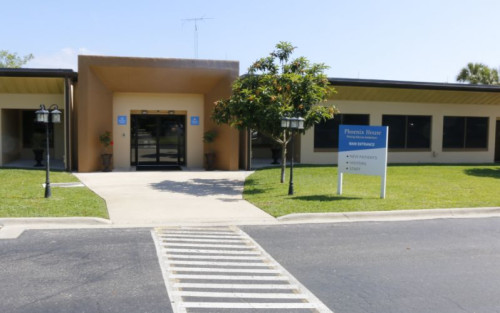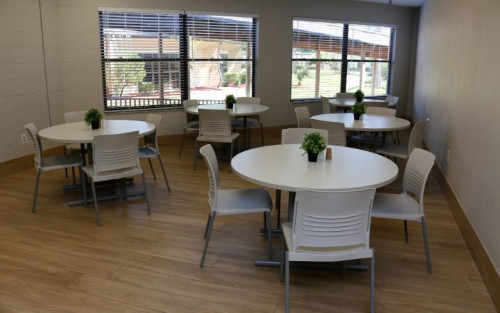






Phoenix House Florida - Citra Residential Treatment Facility
Treatment Focus
This center treats substance use disorders and co-occurring mental health conditions. Your treatment plan addresses each condition at once with personalized, compassionate care for comprehensive healing.
Primary Level of Care
Offering intensive care with 24/7 monitoring, residential treatment is typically 30 days and can cover multiple levels of care. Length can range from 14 to 90 days typically.
This provider hasn't verified their profile's information. Are you the owner of this center? Claim your listing to better manage your presence on Recovery.com.
Treatment Focus
This center treats substance use disorders and co-occurring mental health conditions. Your treatment plan addresses each condition at once with personalized, compassionate care for comprehensive healing.
Primary Level of Care
Offering intensive care with 24/7 monitoring, residential treatment is typically 30 days and can cover multiple levels of care. Length can range from 14 to 90 days typically.
Provider's Policy
We accept most major insurances, including Aetna, Ambetter, America's PPO, Anthem, AvMed, BayCare, BlueCross BlueShield, Cigna, GHI, GEHA, HealthFirst, Humana, Magellan Health, MHNet, Oxford Health Plans, UniCare, UnitedHealthcare, and ValueOptions. Please call our staff for more details.
Phoenix House Florida - Citra Residential Treatment Facility
Phoenix House Florida - Citra Residential Treatment Facility
About Phoenix House Florida - Citra Residential Treatment Facility
Phoenix House is a dual-diagnosis treatment provider with several locations in Citra and the Tampa Bay area offering residential and outpatient treatment to adults and teens who are struggling with addiction and co-occurring mental health. Their location in Citra provides individualized and comprehensive inpatient treatment for adults.
Phoenix House offers strength-based, holistic treatment for addiction and underlying mental health disorders in a structured and healing environment. Skilled and compassionate clinicians provide assessments, individual and group counseling, co-occurring mental health treatment, case management, and discharge planning for clients.
Individualized Care
Phoenix House in Tampa offers adults a safe and supportive environment to focus on recovery. Clients go through an initial medical and psychological assessment that will identify their unique treatment needs and provide them with a comprehensive treatment plan. Individually tailored treatment plans are designed to meet each individual’s treatment needs, and case management services provide regular monitoring to track progress and make adjustments accordingly. Clients will work toward their recovery goals with a team of qualified professionals that include licensed therapists, counselors, and trained medical staff who are committed to providing quality care in a supportive environment.
Their highly structured dual-diagnosis program offers holistic, evidence-based treatment. Residential treatment may consist of individual and group therapy and recreational therapy activities that encourage clients to find substance-free leisure hobbies that they enjoy. They use proven methods such as cognitive behavioral therapy (CBT), motivational interviewing, and trauma-specific therapy as part of their programs. The group therapies may be gender-specific so clients can discuss more sensitive concerns. The women's groups in particular work to develop trust, self-esteem, and personal responsibility. Additionally, experiential therapy methods may include creative activities led by a therapist, such as art, dance, or music therapy used to promote social and emotional well-being.
In addition to evidence-based therapies, patients will also receive life skills training as part of their treatment to help with reintegration back into society and maintaining sobriety. Phoenix House also offers medication-assisted treatment (MAT) to clients who are struggling with physical dependency, which includes medications that can help manage and alleviate the physical symptoms of withdrawal such as methadone or suboxone.
Phoenix House is active in engaging with the community, advocating for addiction and mental health treatment and recovery resources. After treatment, clients are connected to a strong alumni network, providing ongoing support and allowing them to stay connected, provide encouragement, and share experiences with others in recovery. Discharge planning can assist clients in finding outpatient support once they complete their residential program, either at Phoenix House's Tampa Bay locations or at another nearby facility.
Phoenix House in Tampa is CARF-accredited, and they accept most major credit cards and insurance providers.
Center Overview
Treatment Focus
This center treats substance use disorders and co-occurring mental health conditions. Your treatment plan addresses each condition at once with personalized, compassionate care for comprehensive healing.
CARF Accredited
CARF stands for the Commission on Accreditation of Rehabilitation Facilities. It's an independent, non-profit organization that provides accreditation services for a variety of healthcare services. To be accredited means that the program meets their standards for quality, effectiveness, and person-centered care.

Insurance Accepted
Cash Pay Rates
Estimated Cash Pay Rate
Center pricing can vary based on program and length of stay. Contact the center for more information. Recovery.com strives for price transparency so you can make an informed decision.
Levels of Care






Your Care Options
Specializations
Alcohol
Using alcohol as a coping mechanism, or drinking excessively throughout the week, signals an alcohol use disorder.
Drug Addiction
Drug addiction is the excessive and repetitive use of substances, despite harmful consequences to a person's life, health, and relationships.
Who We Treat
Approaches
Evidence-Based
A combination of scientifically rooted therapies and treatments make up evidence-based care, defined by their measured and proven results.
Family Involvement
Providers involve family in the treatment of their loved one through family therapy, visits, or both–because addiction is a family disease.
Individual Treatment
Individual care meets the needs of each patient, using personalized treatment to provide them the most relevant care and greatest chance of success.
Medical
Medical addiction treatment uses approved medications to manage withdrawals and cravings, and to treat contributing mental health conditions.
Gender-Specific
Separate treatment for men or women can create strong peer connections and remove barriers related to trauma, shame, and gender-specific nuances.
Therapies
1-on-1 Counseling
Patient and therapist meet 1-on-1 to work through difficult emotions and behavioral challenges in a personal, private setting.
Family Therapy
Family therapy addresses group dynamics within a family system, with a focus on improving communication and interrupting unhealthy relationship patterns.
Life Skills
Teaching life skills like cooking, cleaning, clear communication, and even basic math provides a strong foundation for continued recovery.
Medication-Assisted Treatment
Combined with behavioral therapy, prescribed medications can enhance treatment by relieving withdrawal symptoms and focus patients on their recovery.
Motivational Interviewing
Based on the idea that motivation to change comes from within, providers use a conversational framework to discover personalized methods for change.
Motivational Interviewing and Enhancement Therapy (MET)
This approach is based on idea that motivation to change comes from within. Providers use a conversational framework that may help you commit to recovery.
Music Therapy
Singing, performing, and even listening to music can be therapeutic. Music therapy sessions are facilitated by certified counselors.
Relapse Prevention Counseling
Relapse prevention counselors teach patients to recognize the signs of relapse and reduce their risk.
Substances We Treat
Alcohol
Using alcohol as a coping mechanism, or drinking excessively throughout the week, signals an alcohol use disorder.
Co-Occurring Disorders
A person with multiple mental health diagnoses, such as addiction and depression, has co-occurring disorders also called dual diagnosis.
Cocaine
Cocaine is a stimulant with euphoric effects. Agitation, muscle ticks, psychosis, and heart issues are common symptoms of cocaine abuse.
Drug Addiction
Drug addiction is the excessive and repetitive use of substances, despite harmful consequences to a person's life, health, and relationships.
Heroin
Heroin is a highly addictive and illegal opioid. It can cause insomnia, collapsed veins, heart issues, and additional mental health issues.
Opioids
Opioids produce pain-relief and euphoria, which can lead to addiction. This class of drugs includes prescribed medication and the illegal drug heroin.
Prescription Drugs
It's possible to abuse any drug, even prescribed ones. If you crave a medication, or regularly take it more than directed, you may have an addiction.
Languages
Aftercare
Care Designed for Your Needs
Personal Amenities
Amenities
Special Considerations
Gender-specific groups
Patients in gender-specific groups gain the opportunity to discuss challenges unique to their gender in a comfortable, safe setting conducive to healing.
Activities
Smoking and Vaping Policy

What people are saying
Treatment
3.6
Accommodations
3.0
Food & Nutrition
2.4
Value
3.1
Alisha Brady
Reviewed 11/17/23
Review from Rehabs.com
Michael Richman
Reviewed 10/30/23
Review from Rehabs.com
Stephen
Reviewed 10/10/16
Review from Rehabs.com
Melissa
Reviewed 10/10/16
Review from Rehabs.com
Anonymous
Reviewed 10/10/16
Review from Rehabs.com





